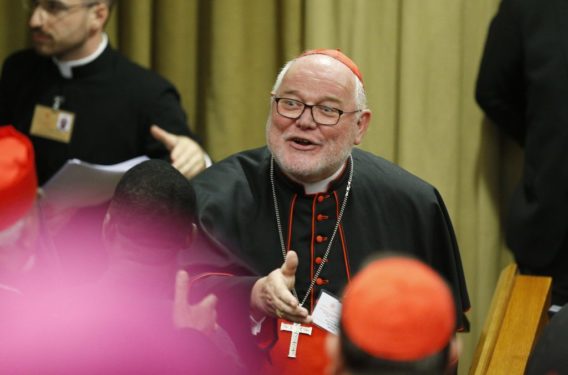By Christopher White, The Tablet’s National Correspondent

ROME – According to German Cardinal Reinhard Marx, this month’s gathering of bishops at the Vatican is not a “Synod on Sexuality.”
Instead, he insisted that that the nearly 300 delegates from around the world can’t lose sight of the fact that young people are the primary focus of the high-profile meeting.
“Some would like to bring it [the issue of sexuality] right to the core, others would want to set it aside. At the heart of our considerations, we have youth,” said CardinalMarx, who is the archbishop of Munich and Freising and a member of the pope’s advisory group of cardinals known as the “C-9.”
Cardinal Marx’s comments came during a Vatican press briefing on Wednesday as this month’s Synod of Bishops on “Young People, the Faith, and Vocational Discernment” which is in its final weeks, and there is much speculation as to whether the outcome document will use the acronym “LGBT” in referencing pastoral concerns of homosexual persons.
The German cardinal warned against weaponizing the issue, saying it “should not be exploited and used in an ideological battle.”
Even so, he added, it must be addressed, as sexuality is a concern of young people. He noted that the Church’s consideration of the topic “should not be limited to physical sexuality.”
Cardinal Marx said that one dimension of this is chastity, which he suggested could be the topic of a separate gathering or even its own synod.
Bishop Andrew Nkea Fuanya of Mamfe, Cameroon, who in previous interviews has expressed concern that the final document would use language referencing the phrase LGBT said that if he returned to his diocese, “99.9%” of my youth will “raise their hands and ask ‘what’s that?’”
He also warned that the Church must be vigilant against foreign aid by Western governments that seek to tie funding to acceptance of particular language, such as LGBT rights.
“We cannot play into the hands of governments, we cannot play into the hands of funding groups,” Bishop Nkea said.
The bishop then insisted that the synod’s final document focus on global problems of the Church.
“We’re not solving problems of particular continents or local churches,” he argued.
Cardinal Marx seemed to concur, saying “it’s necessary to identify language that’s acceptable to everyone.”
The issue of whether or not to use the language of LGBT has been part of the synod discussions since the first day of speeches when Archbishop Charles Chaput of Philadelphia used his opening remarks to warn against it.
Among other issues discussed, Marx said that the Church should do a better job of incorporating women into leadership – “not tomorrow, but today,” – while avoiding answering specifics about whether he expects Pope Francis to green light women deacons for the Church.
Drawing on his own experience at home, he discussed a German program for women’s mentoring that has been very successful.
“I think we’d be really foolish if we fail to make use of this potential women could add,” said Cardinal Marx.
On the issue of sex abuse, Cardinal Marx said he did not believe it mattered where in the final document that sex abuse is addressed, but rather the content and the implementation of the Church’s reforms on the matter.
Also speaking at the press conference was Archbishop Grzegorz Ryś of Łódź, Poland, who estimated that fifty percent of his young people attend Mass and go to confession, “but it doesn’t mean they know Jesus,” he lamented.
“In the end, God is not an abstract, an idea,” he challenged, saying that the synod’s final document needs to focus on emphasizing the personal nature of Jesus Christ.
Bishop Nkea said that his own experience in Cameroon is different than many places in the western world, where his masses are still well attended by young people and their families.
“The traditional values of the African people still correspond with the values of the Church,” he maintained, noting that the “aspect of family is very strong for us.”
He said he hoped the synod’s final document would reflect that reality with “undiluted and uncontaminated” truths about the faith.
The Vatican prefect of the Dicastery for Communication, Paolo Ruffini, announced today that the synod’s letter to young people was read aloud in the synod hall for the first time today and included a discussion on potential revisions.
The letter will be read on Sunday at the closing Mass for the Synod of Bishops, which will be presided over by Francis.
